#wga
Text
Big Labor News, the WGA won on nearly all fronts.
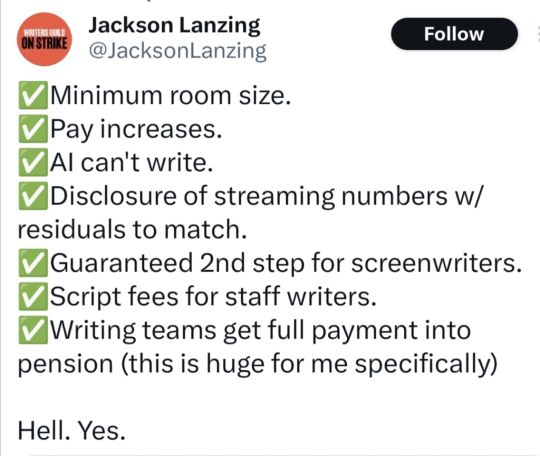
Alt text created by @a-captions-blog
60K notes
·
View notes
Text
exactly!

55K notes
·
View notes
Text
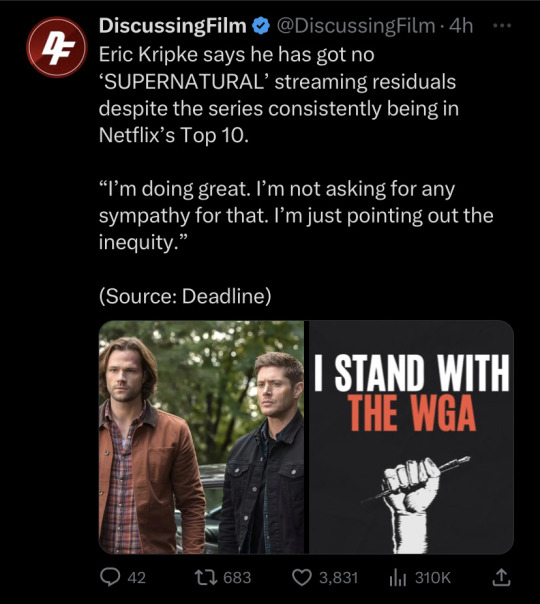
Wait hold on Tumblr girlies have been carrying that show on netflix for well over 10 years now and even the guy responsible for it hasn’t gotten a GOD DAMN DIME?????
#netflix#supernatural#wga#wga strike#sag aftra#sag afra strike#tumblr#supernatural tumblr#castiel#destiel#superwholock#support the wga#writers strike
75K notes
·
View notes
Text
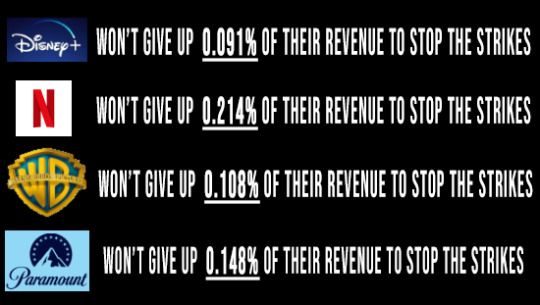
It's crazy that these strikes are happening given that all the writers and actors are asking for is less than 0.3% of the revenue these studios make.
101K notes
·
View notes
Text
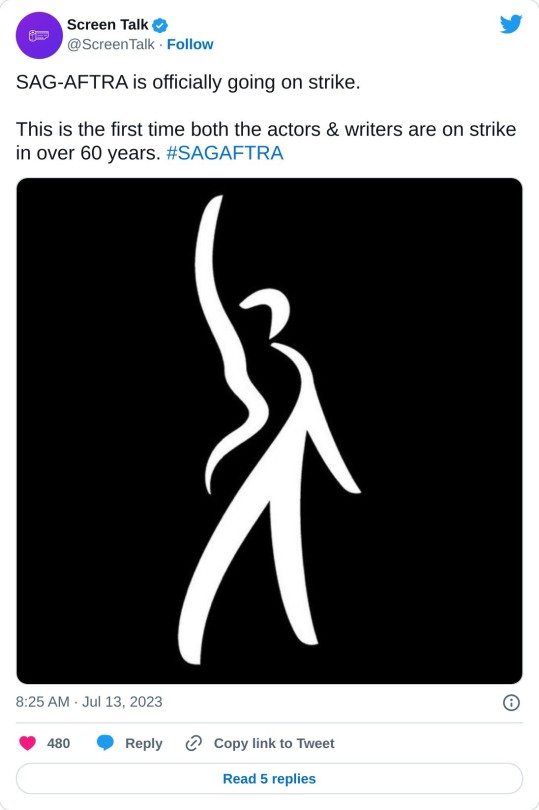
Strike is on. Actors will be joining the writers on the picket lines. This is the first strike in 60 years for SAG, and essentially shuts down the entire US film and television industry.
81K notes
·
View notes
Text
At first Netflix said, come write for us. We’ll save your cancelled shows and write about whatever niche story you want. Our algorithm says people will watch it!
Then a few years later they said, regardless of our promises or contract obligations we are cancelling shows after two seasons without telling anyone. Turns out no matter how loved a show is, we get less subscriptions after the second season.
How many subscriptions did we bring you? Netflix won’t say.
So writers started writing two season shows. Just give us two seasons, Netflix. Like you promised.
Then Netflix said, oops sorry! Turns out your show didn’t premiere at #1 and the views in the first day weren’t what we wanted so we’re cancelling your second season.
What were the numbers? How many people watched our show? Netflix doesn’t say.
Then, they did something extra special. They started taking shows and splitting their first season into two halves. Inside Job was not two seasons. It was one season split in half.
Oops! Sorry! The second half of your first season didn’t do as well as the first half, so now your show is cancelled!
Why? How many people? How much money? These companies are making cash hand over fist and they refuse to tell people the truth: people loved your show. Loved it. But some corpo exec wanted an infinite money making machine. Do you know how long shows are in production for before you watch them? Years. Like, 5+, even 10+ years. And Netflix gives it less than a week before they decide whether you’re getting cancelled.
Support #WGA Support #SAGAFTRA
46K notes
·
View notes
Text
“If this hurts my shows I’m gonna riot” “they better not cancel my favorite show” “this is so selfish I NEED this show” “what about my mental health now that they—“

So you agree. Show-writers are important to you and to the industry and should be compensated accordingly for their important work.
88K notes
·
View notes
Text
Hey y'all. With the Writer's Guild of America on strike, you might be hearing a lot more about something called "residuals," which are payments that the writers get for the studios continuing to air their work on reruns and such. Already I'm seeing people trying to frame the union trying to bargain for better residuals as greedy and unreasonable, so I just wanted to give you guys a peek into my dad's full, 100% real residual payments for writing some of the most watched episodes of American late night television.
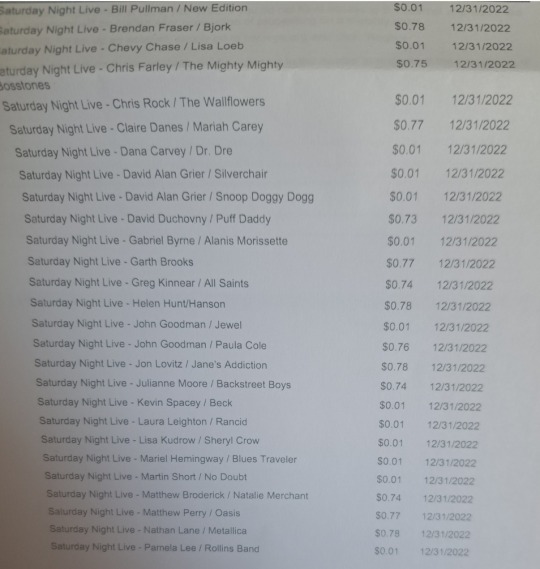
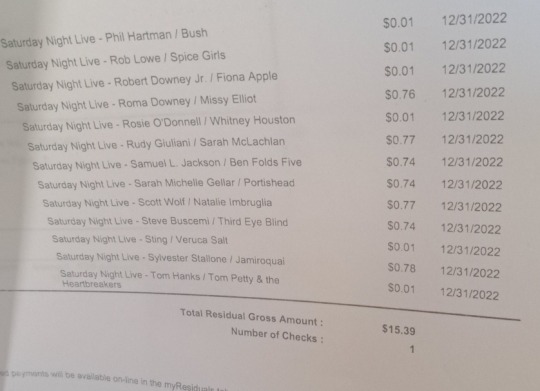
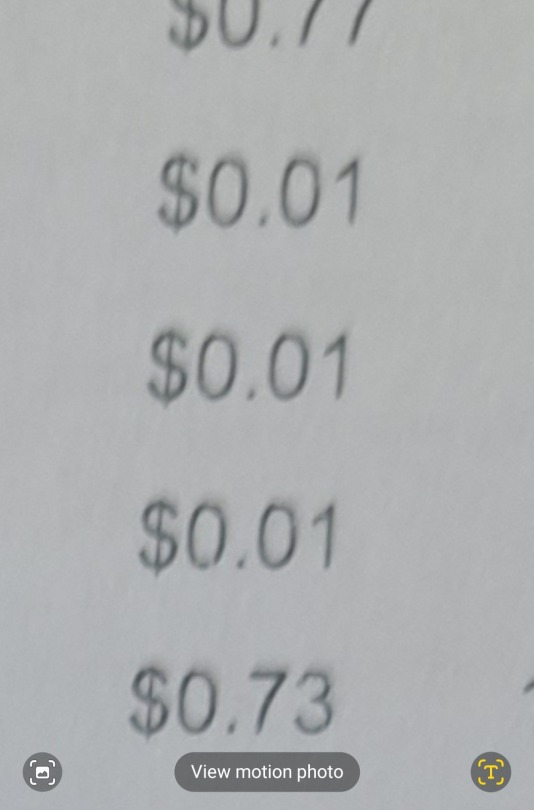
Yeah lol. If u hear anyone trying to frame the conversation around residuals as writers being greedy, please do me a favor and punch them straight in the face ❤️🙃🙃
#wga strike#gingerswagfreckles#writer's strike#wga#writer's guild of america#saturday night live#snl
62K notes
·
View notes
Text
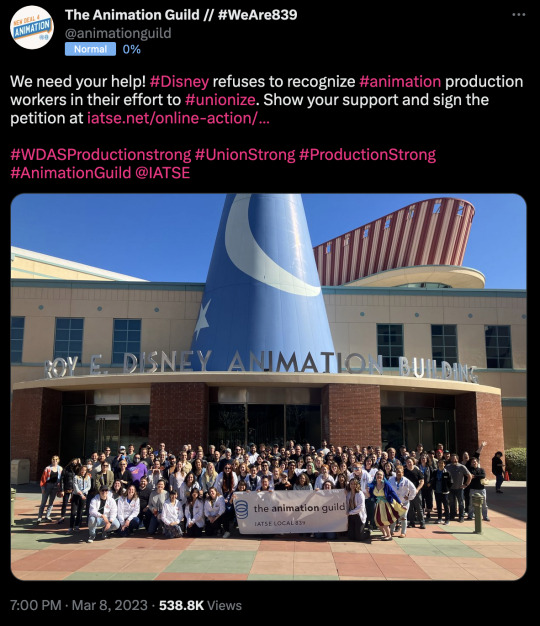
Edit because I fact-checked myself after the fact, my apologies:
TAG (The Animation Union) already exists and covers animation artists & writers. The above petition is about ADDING specific production roles to the union, and asking Disney to voluntarily recognize that unionization.
original text of the post with clarifying edits below
don't forget during the WGA strike that animation is not covered under the WGA deals [edit: but it is covered under TAG!] and as a result animation has gotten the shortest possible end of the stick in under-staffing, under-paying, and generally turning the field into gig employment.
please sign the petition here for Disney to recognize animation production workers as a union [edit: in the already existing TAG union!] and reblog this post!
58K notes
·
View notes
Text
Does anyone have an update on where things are at with the writers strike? It's disappeared from my various feeds and algorithms.
45K notes
·
View notes
Text
I pointed this out in a Discord server I'm in and thought Id share here:
Bob Iger announced that Disney is going to absorb Hulu, and Hulu will no longer exist next year. All shows will move to the Disney+ app.
Disney also announced they were going to remove shows and movies periodically from their streaming services.
I believe both of these moves are because of the Writers Strike.
Disney knows its going to lose the strike. There is too much public support. Specifically, the WGA is going to win writers getting more residuals from streaming.
So if Disney takes shows off of streaming, they dont have to pay the writers the residuals.
They are going to use excuses like "not enough funding for the server capacity" or "not enough views to warrent keeping the show". These are BULLSHIT. Its all greed. Its only GREED.
Pay attention to what happens in the following weeks.
And keep supporting the writers' strike.
#writers strike#writer's strike#wga#wga strike#disney#disney+#bob iger#greed#corporate greed#my words#my thoughts#keep supporting the strike#support unions
53K notes
·
View notes
Text
this is really good news! the writer’s strike is over! let’s hope the same positive outcome for the sag strike next!


35K notes
·
View notes
Text
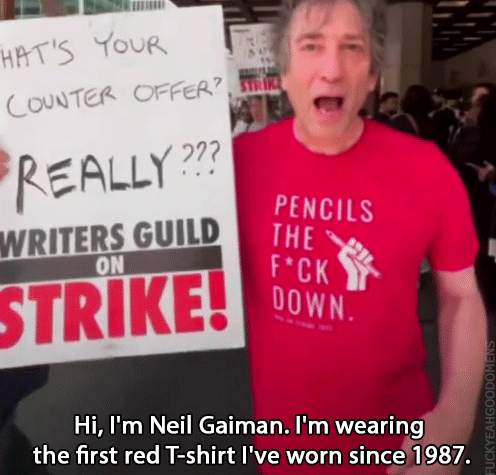
Precious man (not in black!) sighted ❤ (x,x)
Neil Gaiman: Hi, I'm Neil Gaiman. I'm wearing the first red T-shirt I've worn since 1987. Because I'm a member of the WGA. I'm on strike. I care so much for the things that I've written but I'm out here right now not working and here until we get a good contract because I care about the future of the WGA, the future of young writers. I want a world in which no AI writes scripts or attempts to. I want a world in which young writers get to learn how to make television. And I want a world in which we are fairly compensated for the things that we put up on streaming.
43K notes
·
View notes
Text
I was on a plane this weekend, and I was chatting with the woman sitting next to me about an upcoming writer’s strike. “Do you really think you’re mistreated?” she asked me.
That’s not the issue at stake here. Let me tell you a little something about “minirooms.”
Minirooms are a way of television writing that is becoming more common. Basically, the studio will hire a small group of writers, 3-6 or so, and employ them for just a few weeks. In those few weeks (six weeks seem to be common), they have to hurriedly figure out as much about the show as they can -- characters, plots, outlines for episodes. Then at the end of the six weeks, all the writers are fired except for the showrunner, who has to write the entire series themselves based on the outlines.
This is not a widespread practice, but it has become more common over the past couple of years. Studios like it because instead of paying for a full room for the full length of the show, they just pay a handful of writers for a fraction of the show. It’s not a huge problem now, but the WGA only gets the chance to make rules every three years -- if we let this go for another three years and it becomes the norm? That would be DEVASTATING for the tv writing profession.
Do I feel like I’m mistreated? No. I LOVE my job! But in a world of minirooms, there is no place for someone like me -- a mid-level writer who makes a decent living working on someone else’s show (I’d like to be a showrunner someday, but for now I feel like I still have a lot to learn, and my husband and I are trying to start a family so I like not being support rather than the leader for now). In a miniroom, there are only two levels -- the handful of glorified idea people who are already scrambling to find their next show because you can’t make a decent living off of one six-week job (and since there are fewer people per room, there are fewer jobs overall, even at the six-week amount), and the overworked, stressed as fuck showrunner who is going to have to write the entire thing themselves. Besides being bad for me making a living, I also just think it’s plain bad for television as an art form -- what I like about TV is how adaptable it is, how a whole group of people come together to tell a story better than what any of them could do on their own. Plus the showrunner can’t do their best work under all of that pressure, episode after episode, back to back. Minirooms just...fucking suck.
The WGA is proposing two things to fix this -- a rule that writers have to be employed for the entire show, and a rule tying the number of writers in the room to the number of episodes you have per season. I don’t think it’s unreasonable. It’s the way shows have run since the advent of television. It’s only in the last couple of years that this has become a new thing. It’s exploitative. It squeezes out everyone except showrunners and people who have the financial means to work only a few months a year. It makes television worse. And that is the issue in this strike that means everything to me, and that is why I voted yes on the strike authorization vote.
50K notes
·
View notes
Text
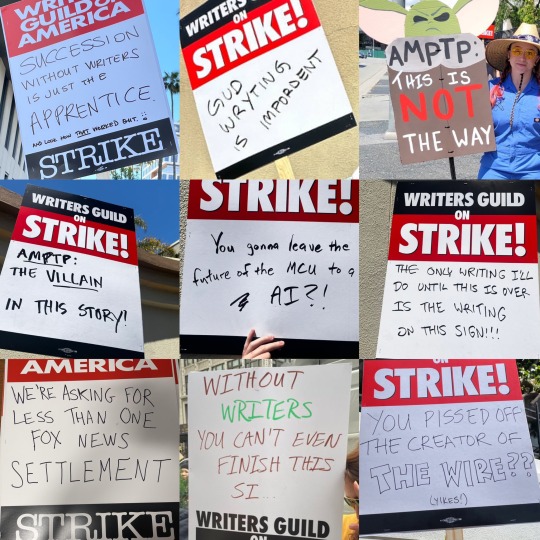
It shouldn’t be surprising that writers have some of the best strike signs in existence
58K notes
·
View notes
Text
you guys love artists until they ask to be paid what they’re worth
#it’s not sustainable and none of y’all actually value artists time#text post#top posts#wga#sag strike#5k#10k#15k#20k#25k
30K notes
·
View notes